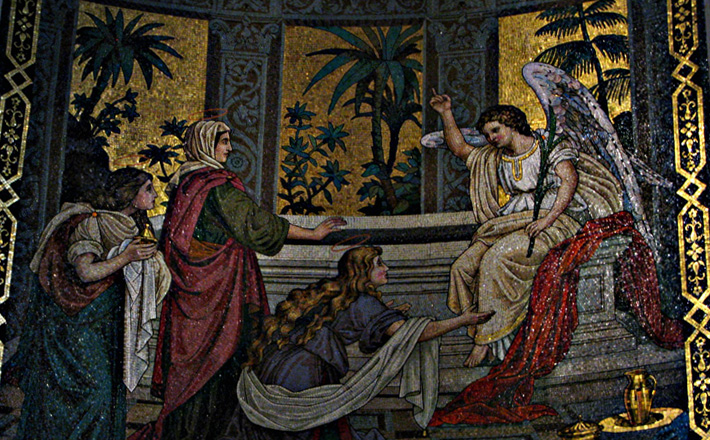Commentary on Colossians 3:1-4
It’s Easter Sunday and you get to choose from: a) John 20, in which Mary Magdalene is called by name by the risen Lord, b) Acts 10, in which Peter summarizes in a mere ten verses the whole story of the Jesus up to and including his resurrection, and c) four curt, allusive, poetic, and wrenched-out-of-context verses from Colossians. Tough choice!
This snippet of Colossians has, as an Easter text, everything against it: “Seek the things that are above.” This passage sets all the wrong bells ringing. It sounds gnostic, as if we were to eschew the material filth that weighs down our souls and peer into the great ether of Platonic purity. It sounds like religiously justified absenteeism from real life, scorning the workaday vocations of family and state and economy to dwell daintily in a celestial starscape. It sounds like that most scorned version of Christianity, “pie in the sky by and by,” heavenly hopes to the exclusion of earthly engagement. “Set your mind on things that are above”—what are you, some kind of snob? Too holy for the likes of us down here?
Of course, none of the foregoing is an accurate reading of this portion of Colossians, or of the Epistle as a whole, though it’s hard to garner that from these verses standing alone. The immediate run-up to the exhortation to keep your sights set high is a warning against competing forms of false religiosity.
In Christ, you died to the “elemental spirits of the universe” (Colossians 2:8, 2:20), so why do you carry on living as if you were enslaved to them? Christ redeemed you and forgave you, so why do you keep thinking that mere “human commands and teachings” (2:22) like “food and drink or of observing festivals, new moons, or sabbaths” (2:16) with their “appearance of wisdom” (2:22) count as good religion? The worship of creaturely spirits and blind observance of human traditions are the things that are “below.” They are the alternatives to “the things that are above.”
“Things above” refers to what comes from the true God, the Father, and “his beloved Son, in whom we have redemption, the forgiveness of sins” (1:14). The point of the exhortation is that we should give our attention and worship to the true God instead of pretenders to the throne. But it in no way suggests a gnostic or a falsely pious disdain of the created world.
Actually, and rather surprisingly, Colossians suggests that heaven and earth were in the same boat, so to speak. Christ came to reconcile “all things, whether on earth or in heaven.” He did so not by lordly fiat or a miraculous airlift of the worthy out of the domain of suffering but by “making peace by the blood of his cross” (1:20), “in his body of flesh by his death” (1:22). You can’t get any more this-worldly than a body bleeding to death on a cross.
Those who are now transferred into the kingdom of light, the church, are to grow to maturity in their faith and their life together, “being knit together in love” (2:2). They should cast off the flesh in confidence that the body will be raised—a distinction that needs to be made continuously and tirelessly. Colossians 3 carries on from its entreaty on behalf of the “things above” to talk about the sins of this life that need to be crucified, the proper virtues to exercise in fellowship, and the nature of the relationships between spouses, parents and children, and masters and slaves—reciprocal and centered around Christ at every point. Having the mind set on “things above” is no escape from the tasks and struggles of this earth. It’s rather having the Star of Bethlehem to orient one’s journey.
A common Easter exchange is “Christ is risen!—He is risen indeed!” A Colossians variation on the theme might be: “You have died!—I have been raised with Christ!” Both assertions are true, and true at the same time. Colossians is all about the stereoscopic vision that comes from the resurrection. You see yourself as dead, and you equally see yourself as alive. You carry out the business of this earth in public and in broad daylight, yet your life is also hidden with Christ in God. When Christ is revealed in his glory, you also will be revealed in the same glory, despite your status as sinner transferred from the kingdom of darkness.
How can you set your mind on the things above while living on the earth? By the double vision of the Christian faith. Faith gives us the lenses to see reality aright and accordingly act, obediently, and joyfully.


April 16, 2017